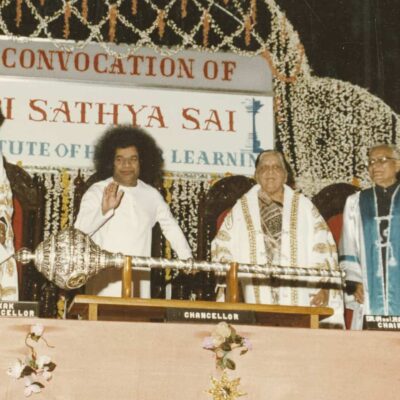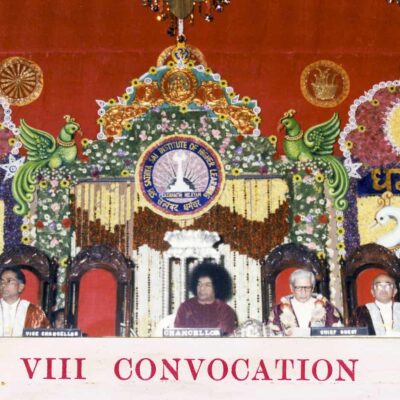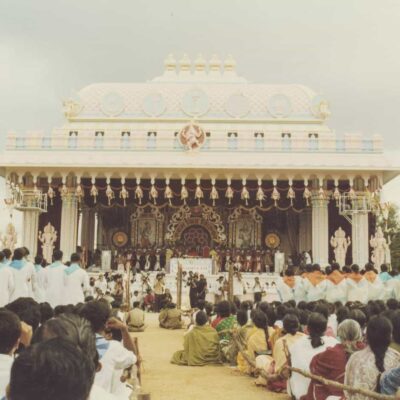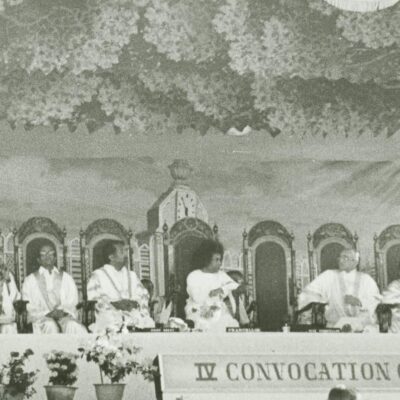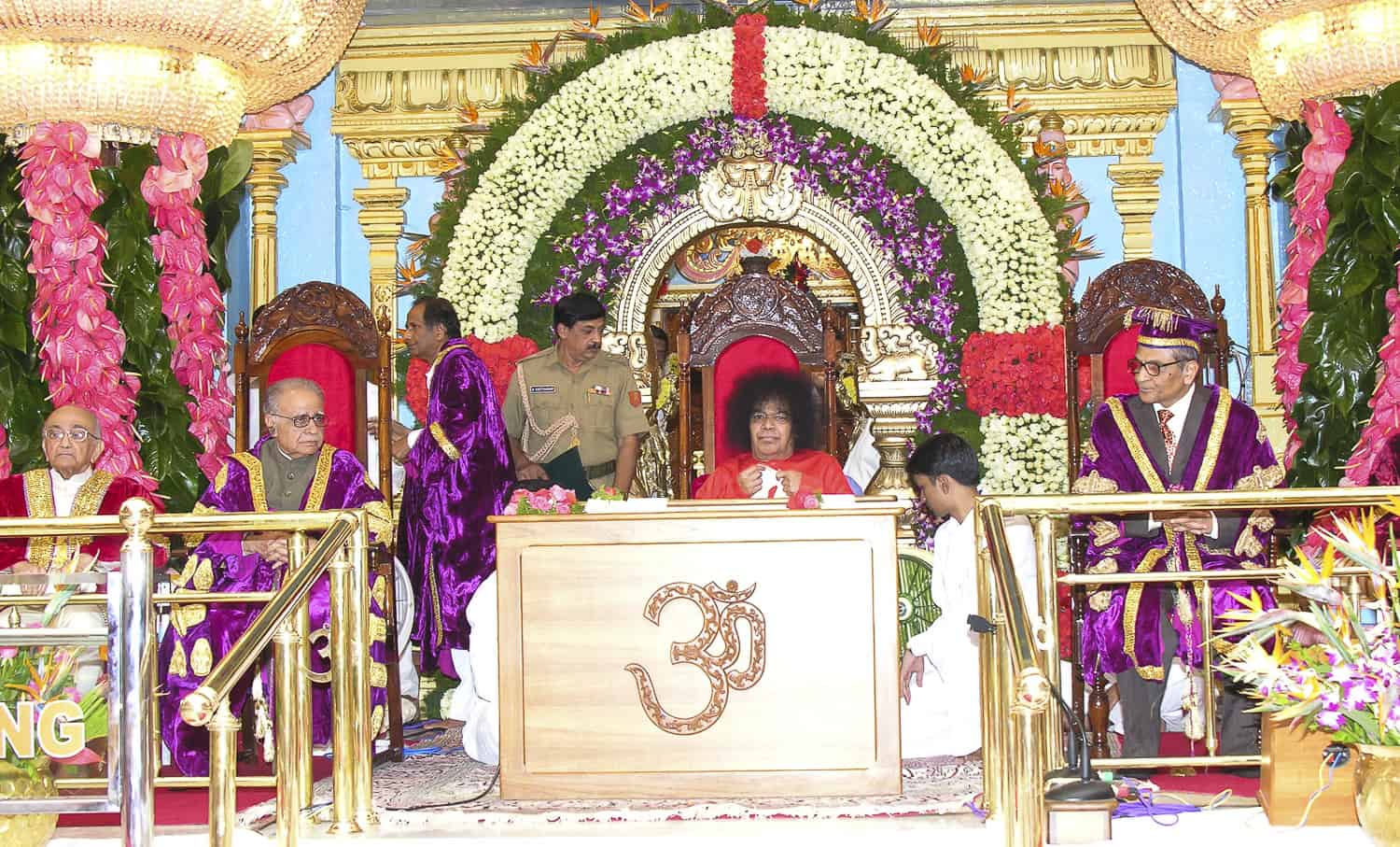
SSSIHL XXIV Convocation Discourse – 2005
Audio excerpt of the Divine Discourse by Bhagawan Sri Sathya Sai Baba during the SSSIHL Annual Convocation
Truth and Righteousness are the Foundation of True Education
Students – Boys and Girls!
There is nothing much to be said about education. But education has a goal. That is truth. If it does not give the knowledge of truth, then it is not true education. There are crores (hundreds of millions) of so called educated people in the world today. But, what is it that they are doing? They have no spirit of Paropakara (doing good to others) in them.
Modern Education Develops Selfishness
Nevertheless, students are engaged in acquiring education. The education that they acquire is only secular education and not spiritual education. In fact, only spiritual education is true education. One should acquire spiritual education since it gives the knowledge of God. Secular education merely enables a person to eke out a living and thereby maintain himself and his family. The end of education is character. Devoid of character, everything else is useless. Unfortunately, today we have distanced ourselves from this sacred goal of education. Of what use is it to acquire such an education which does not help one to attain its goal? Modern education enables one to acquire merely worldly gains. But fulfilling one’s physical requirements is not the be all and end-all of education. Besides catering to one’s worldly progress, it should help one to attain inner growth. Education should enable one to cultivate good qualities, character and devotion. There should be balance between worldly progress and inner growth. There should be unity between one’s thoughts and actions. Only when there is unity can one realise divinity.
Modern education develops selfishness and selfishness alone. True education is that which fosters selflessness. True education does not limit one to serve only one’s selfish ends; it elevates one to serve others. Paropakara Punyaya, Papaya Parapeedanam (one attains merit by serving others and commits sin by harming them). Wherever you see today, you find only selfishness. The foremost concern of man is self-interest. But he forgets his real Self. That is the Atma which is present in everyone. It is Chaitanya Shakti (power of consciousness). This Chaitanya Shakti is present in every being. That is why, the Vedas declare: Easwara Sarva Bhutanam (God is the indweller of all beings). One should give up one’s self-interest and strive to realise the Atma Tattwa (principle of the Self). Modern education is steeped in utter selfishness. It is only when man transcends his self-interest can he acquire true education and purity of heart. Only man can practise selflessness and realise the Atma Tattwa; birds, beasts and animals cannot do so. One who helps others selflessly, develops a spirit of sacrifice and realises the Self can be called a human being in the true sense of the term; not merely by acquiring secular education.
Acquire Education which Develops Character
Man has value only when he is endowed with character. One without character cannot be called a human being. Hence, acquire that education which develops character. Education is not meant to fill our pockets with money. After all, what can money do? In what way can it help us? It may perhaps help us to acquire name and fame and build palatial buildings. But without character, all this amounts to zero. Unfortunately, such people are flourishing in the world today. In fact, a person without character is unfit to be called a human being. He is verily an animal. Even an animal is better than such a person, for it has a reason and a season. But man today has no reason and no season! He moves about everywhere as an epitome of selfishness.
Once selfishness enters man’s life, his degeneration starts immediately. Character is most important in the life of man. Truth and righteousness are the foundation of character. Sathyannasti Paro Dharma (There is no Dharma greater than adherence to truth). The mansion of righteousness rests on the foundation of truth. If the very foundation of truth collapses, there can be no righteousness. Hence, truth and righteousness are the two most important limbs of a human being. Where there are truth and righteousness, there love manifests. Without truth, righteousness and love, there can be no peace. And there is little use of your positions of power and authority if you are without truth, righteousness, love and peace.
Many people complain, “I have everything in life, but I have no peace of mind”. A person without peace of mind is confronted with troubles from all sides. If only he has peace of mind, he can be happy in the world. He will have no difficulties at all! In fact, man has great accumulated merits. It is because of these merits earned by him in his previous lives through the observance of truth and righteousness that he gets human birth. Without truth and righteousness, man loses his humanness. He degenerates himself to the level of a demon or an animal. The word ‘Manava’ (man) consists of three letters: ‘ma’, ‘na’, ‘va’. ‘Ma’ means attachment, ‘na’ means without and ‘va’ means to conduct oneself. One who conducts himself in the world without attachment is Manava. Only such a person can be called a real human being. How does man develop attachment? He marries, begets children, develops a family; all these relationships become the cause of his attachment. He loses peace on account of attachment.
Man today has everything – good food to eat, various means of enjoyment, facility of comfortable travel, but he has no peace. Man should attain freedom from the bondage of attachment to have peace of mind. Develop Ekatma Bhava (feeling of oneness with God). If man develops Ekatma Bhava, he can move about freely in the world without any attachment whatsoever. He loses his freedom and becomes bound when he develops desires, lust, etc. Where there is lust, love cannot exist there. Man should spread the fragrance of love and goodness like a rose flower which spreads fragrance. When man develops good thoughts and good behaviour, he will become a symbol of goodness. Without love and goodness, man develops attachment. Happiness lies in detachment. Detachment however does not mean that you become indifferent to the difficulties of others. Help everybody; be compassionate towards the poor. If you have love and compassion, you are a true human being.
What is True Renunciation?
During his debating tour of north India, Adi Sankara met a great scholar named Mandana Mishra. He had a wife by name Ubhayabharati. She was selected to be the arbitrator and judge to decide the winner in the debate between Sankara and Mandana Mishra. In fact, Sankara himself suggested her name as he considered her most truthful and impartial despite being the wife of his competitor, Mandana Mishra. She considered truth as God and was therefore eminently suited for the assignment. The debate between Sankara and Mandana Mishra commenced in the presence of Ubhayabharati. She listened to the arguments and counter arguments with rapt attention. Finally, Sankara defeated Mandana Mishra in the debate and he was declared the winner by Ubhayabharati. As per the conditions of the debate, Mandana Mishra had to take to Sannyas (renunciation), and he did accordingly. As a dutiful wife, Ubhayabharati followed suit and she also became a renunciant. A question may arise here as to what is Sannyas in the real sense of the term. It is renouncing of all desires. As long as a person entertains desires, he will only be a Samsari (worldly person). He will develop worldly relationships. He will desire to have a son in the first instance. Thereafter, the whole retinue of daughter-in-law, grandsons, granddaughters, etc., will follow.
One day, Ubhayabharati was going along with her disciples to the river Ganga for taking bath in the river. On the way, she observed a Sannyasi who was relaxing, keeping a dried bottle gourd under his head. He was using this for storing drinking water, and hence he was preserving it carefully. Ubhayabharati saw this Sannyasi’s attachment to the bottle gourd and said to her disciples, “Look! This man calls himself a Sannyasi, but he is attached to a bottle gourd which he is keeping under his head as a pillow.” The Sannyasi heard this comment, but did not utter anything then. While Ubhayabharati and her disciples were returning from the river, he threw away the bottle gourd in front of them in order to demonstrate that he was not attached to it. Observing his action, Ubhayabharati aptly remarked, “I thought there was only one defect in him Abhimana (attachment). Now I realise that he has another defect also Ahamkara (ego). How can one with Abhimana and Ahamkara become a Jnani and Sannyasi?” Her comment was an eye opener for the Sannyasi. He expressed gratitude to Ubhayabharati for imparting true knowledge of renunciation to him.
Your Company Influences your Thoughts and Conduct
People today put up a show as though they have renounced everything. In fact, it is they who crave for worldly possessions. Students should have only one desire. That is Brahmacharya (celibacy, purity). That is real renunciation. When you come here, you pray, “Swami! We don’t want anything. We have no desires like marriage, setting up a family or building a house, etc. Please lead us on the path of devotion and liberation.” But the moment you cross the boundary of the Institute, umpteen number of desires swarm around you like honey bees.
Man’s behaviour is influenced by many factors, like Sthanabala (power of place), Bhujabala (power of physical body), Dhanabala (power of wealth) and Daivabala (power of divinity). The Ramayana illustrates how Sthanabala influences the thinking of man. While going in the forest, Rama and Lakshmana sat under a tree. Immediately afterwards, Lakshmana told Rama that he was tired of living in the forest and would like to go back to Ayodhya as quickly as possible to have a more comfortable living. Rama smiled at him and said, “Let us proceed further, I shall explain everything later.” How did Lakshmana who previously had declared that Rama was everything to him and that he would not live without Rama even for a moment suddenly develop this attitude? How did this concern for bodily comfort arise in him suddenly? After they walked some distance, Lakshmana felt the pangs of repentance for his impertinent behaviour. He realised his mistake, caught hold of Rama’s feet and said, “Rama! Forgive me for what I had said. I cannot understand how these evil thoughts entered me. What could be the reason?” Rama explained, “Lakshmana! The region through which we passed just now was the haunt of a demoness. She used to rest under that tree. Hence, the place is infected with all her devilish qualities. The vibrations of those evil qualities aroused bad thoughts in you. The moment you came out of that place, you became your normal self again. Your inherent good nature asserted itself.” Thus, one’s association with a particular place also has its effect on one’s behaviour. Thereafter, Rama was cautious about the place of their stay in the forest.
Similarly, the type of people you associate with also influence your thoughts and behaviour. Youngsters often move in bad company and cultivate bad qualities. This is not correct. They should always make friendship with good people and emulate their qualities. Never have anything to do with a person of evil qualities. Keep yourself at a distance from such people. The great epic Ramayana is replete with examples how association with good people results in developing noble qualities. Adi Sankara in “Bhaja Govindam” very graphically describes how Satsanga (good company) can ultimately lead one to liberation:
Satsangatwe Nissangatwam,
Nissangatwe Nirmohatwam,
Nirmohatwe Nischalatattwam,
Nischalatattwe Jivanmukti.
(Sanskrit Sloka)
(Good company leads to detachment; detachment makes one free from delusion; freedom from delusion leads to steadiness of mind; steadiness of mind confers liberation.)
Today, people move about in bad company and ultimately ruin themselves. This is the effect of Kali Yuga, which is often referred to as the Kalaha Yuga (the Age of conflict). Man by nature is divine; but turns evil on account of Dussanga (evil company). That is the reason why sages and seers in ancient times constantly strove to cultivate noble qualities by Satsanga.
Today, bad books are found everywhere. Wherever you see, you will find people, especially youngsters, reading bad books that pollute their minds. You might have observed youngsters visiting libraries invariably on Sundays and holidays. You often find them engaged in deep study. What sort of books do they read? They read bad books camouflaged in a good cover. Once you remove the cover and look into the book, everything is trash including the pictures. You will have to be very strict with such students. No one can be taken for granted. They speak sweet words outwardly as though they are very innocent. But they surreptitiously engage themselves in bad activities. They search for bad books and read them with absorbing interest. Those bad books are very exciting to the young minds. People who write bad books and tempt youngsters to read them do not think about the bad effect they will have on their minds. Thus, youngsters spoil themselves on account of bad books. No force on earth can change such boys; not even God.
Unless one introspects into one’s behaviour and strives for transformation, one continues to move about in bad company. One is a true devotee if one recognises one’s faults. One’s character and conduct are of paramount importance. If they are taken care of, one is sure of treading the right path. There is no use acquiring high academic degrees with a view to earn high salary and position. How long will they last? On the other hand, it is possible that they may land one in trouble. Money earned by bad means will be spent for bad purposes. Yad Bhavam Tad Bhavati (as is the feeling, so is the result). So, one should cultivate noble thoughts and feelings.
Students should Inculcate Good Qualities
One has to read good books that transform the heart and uplift the soul. Unlike the students in the Gurukula system of ancient times, modern students indulge in bad behaviour. In spite of great efforts on the part of teachers to bring about a transformation in them, they continue with their bad qualities. It is not surprising to see students assaulting their teachers in educational institutions today. There are students who even betray those who actually provide for their living. There are also students who do not hesitate to harm those who help them. Such are the qualities of the present day students. They do not appreciate the role played by their teachers in their uplift.
What are the qualities expected of a student? A student should have good intellect, good character, adherence to truth, devotion, discipline and duty. Only those students who cultivate such qualities are eligible to be called students in the real sense. One who acts against these principles is not a student, but a stupid. You should not associate with such a person nor should you call him a stupid. Do not have any relationship with such persons. You should hold on to your own good qualities which can earn you appreciation in the world.
Love all. In fact, Love is the most important aspect of education. One who teaches the method by which man can cultivate selfless love is the real Guru. There are, of course, many such teachers. I have established Sri Sathya Sai educational institutions only with a view to inculcate love and good qualities in students. It is not an exaggeration to say that there is not a single bad book in our library. Our students are very good. They do not at all move in bad company. Even when they go home during vacation, they do not like to stay there for long. Sometimes, their mothers may say, “My dear! You stayed for one full year in Brindavan or Puttaparthi. You never had an opportunity to eat tasty and spicy food. I shall now prepare such food that you will relish.” Our students will then reply, “Mother! You should also not eat such Rajasic food. It is not good for health.” As is the food, so is the head (thoughts). Wrong food and bad thoughts make people forget God. Hence, do not change your food habits. Continue to stick to Sattwic diet. Take plenty of green leafy vegetables. It is only when you maintain good habits with regard to food and head will you become good.
You are aware that people outside have high expectations of the students studying in Sri Sathya Sai educational institutions. They will reprimand you if they see you acting in a perverted manner, saying, “You are a student of Sri Sathya Sai institution. How can you behave in this bad manner?” Therefore, our students should never give such an opportunity to others. Rather, they should teach others by setting an ideal to them. Some students, show good behaviour and devotion as long as they remain in our hostels. Once they go out of the portals of the institution, they turn bad. This should not happen. Wherever you are, whether in the hostel here or when you go out, you must continue to have good behaviour. Of course, I have no doubt at all about the behaviour of our students. The students in our hostel and college are very good. With the hope that our students will continue to be good and become worthy of emulation by others, I conclude My Discourse with blessings to all.
Audio Source: Sri Sathya Sai Media Centre, Radio Sai Archives
Transcript Source: ‘Benedictory Addresses’ (Edition: May 2011), published by Sri Sathya Sai Sadhana Trust, Publications Division


